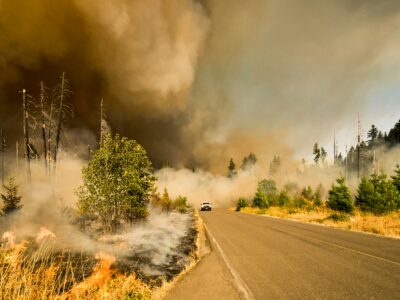Looking Into USDOJ’s Lawsuit To Dismantle the California-Quebec Greenhouse Gas Cap-and-Trade Linkage Program
While DOJ Says It “Didn’t Consult With The White House,” There Are Clues the Case Is Politically-Motivated
My colleagues Ann Carlson and Cara Horowitz wrote last week about the Trump administration Department of Justice’s lawsuit against the California Air Resources Board, the Western Climate Initiative, and various California-based officials of both, claiming California is unlawfully trying to engage in foreign policy through its greenhouse gas cap-and-trade program’s linkage with Quebec. There appear to be some real legal issues in play, and I’ll leave that to others. But I want to focus on another dimension. In the context of the Trump Administration’s ideologically-motivated campaign against California’s greenhouse gas and air quality regulatory programs (a campaign that provoked a letter from 600 former EPA officials asking Congress to investigate the Administration’s apparent retaliatory actions and motives), there may be clues to the political and ideological motivation for this case in the way DOJ is staffing and handling it. (I’d welcome any insights or clarifications from folks who’ve worked for DOJ or otherwise have inside knowledge; as I say below, I’ve worked with DOJ and am familiar with many of its practices, but never worked at the agency myself.)
I’ll start with some context. The lawsuit was filed by the U.S. Department of Justice Environment and Natural Resources Division (ENRD). ENRD is the arm of DOJ that represents the federal government in environmental, natural resources, and public lands issues. It litigates cases involving air quality, water quality, federal public lands, wildlife, toxic substances, mining, and other issues relating to natural resources or the environment. Most of its cases involve representing federal agencies, like the Environmental Protection Agency and the Department of Interior, either in affirmative litigation (for example, enforcing federal laws) or defensive litigation (defending against legal challenges to federal actions). The Division also has independent litigating authority on behalf of the federal government, meaning it can file lawsuits even without a client agency behind it (as it has done here). ENRD is one of several divisions within USDOJ. U.S. Attorney offices throughout the country also are part of DOJ, and typically will partner with main DOJ (including ENRD attorneys) on cases. The practices and procedures for what types of cases USDOJ, and ENRD specifically, handle, how they make decisions about cases, and how the main Department of Justice divisions work with U.S. Attorney offices, are specified in DOJ’s Justice Manual and in several sections of the U.S. Code of Federal Regulations.
In light of that background, it’s worth some focus on what DOJ is saying about how the case came about, and who is working on it within DOJ.
According to Tim Puko in the Wall Street Journal, “Jeffrey Clark, the assistant attorney general of the Environment and Natural Resources Division, said the case isn’t political and that the department didn’t consult with the White House about filing it.” But the idea the case “isn’t political” seems fanciful, in light of the Trump Administration’s campaign against California’s work to address greenhouse gas emissions on multiple fronts. The campaign includes not only attacks on California’s independent authority to regulate emissions, but also a highly unusual and politicized antitrust investigation into the car manufacturers that have been working cooperatively with California on emissions. The rollout of that lawsuit similarly featured the comment, in that case anonymous, that “the Justice Department’s antitrust division is acting on its own accord and without direction from or coordination with the White House.”
As the letter from former EPA staff explains, the Trump administration‘s attacks on California overall are clearly retaliatory and political, aside from furthering a backward-looking stance on emissions. Moreover, DOJ’s politicization in the current administration is well-documented in other contexts. And it’s implausible that the Department would not have consulted with the White House before filing such a significant case about presidential authority. While the lawsuit specifically highlights that support for international inaction on climate change is the official Trump administration policy, the Trump administration executive branch already doesn’t speak with one voice on climate policy (as Ann pointed out in her earlier blog post); most federal agencies (including the Department of Defense) are still working to address climate change in their planning because of the strategic threat it poses to federal operations, and the government has accepted the science in its National Climate Assessments and in its operative endangerment findings under the Clean Air Act. One would think the competent, diligent lawyers at DOJ–speaking with a single voice on behalf of the federal government–would have sorted that out in advance with the White House or their client agencies (none of which are represented in the case) before filing an independent lawsuit on behalf of the United States.
The case also is fascinating for anyone who follows DOJ’s work in this administration, for another, related reason: only the Environment and Natural Resources Division’s attorneys are named on the pleadings, and it seems like an odd fit for ENRD to be handling without involvement of any other DOJ attorneys. Although—of course—the underlying partnership between California and Quebec through the WCI addresses air pollution (greenhouse gas emissions), the subject matter of this lawsuit is foreign policy. And foreign policy is neither a great fit for ENRD nor an area in which it has litigated in the past, as far as I can tell. The core claims in this case involve allegations that California’s partnership with Quebec constitutes an unlawful treaty or compact, interferes with the President’s power to conduct foreign affairs, and interferes with Congress’s authority to regulate commerce with foreign countries. It’s unlikely that ENRD has expertise in these areas, while attorneys in the Civil Division of DOJ surely do. Assistant Attorney General Clark himself, in a recent speech, characterized ENRD’s mandate this way:
The [Environment and Natural Resources] Division has been in existence for nearly 110 years and is built upon a history of service, integrity, and adherence to the rule of law.
***
Our litigation responsibilities at present are broad and include:
Enforcing the nation’s civil and criminal pollution-control laws,
Defending environmental challenges to federal agency programs and activities,
Representing the United States in matters concerning the stewardship of the nation’s natural resources and public lands,
Acquiring real property,
Bringing and defending cases under the wildlife protection statutes, and
Litigating cases concerning the resources and rights of Indian tribes and their members.
Conspicuously missing from this list—and from the federal regulations laying out ENRD’s subject areas, ENRD’s responsibilities as articulated in the Justice Manual, and prior ENRD practice—is enforcement of federal foreign affairs prerogatives, even in the context of environmental issues. The Civil Division of DOJ typically handles cases regarding foreign affairs. Given AAG Clark’s personally-held views that the science of human-caused climate change is “contested” and that Obama-era greenhouse gas regulation was “reminiscent of kind of a Leninistic program from the 1920s to seize control of the commanding heights of the economy,” it may be that this lawsuit is a kind of special project for him in service of destroying robust climate policy, and thus a special project for the division that he leads.
Finally, it’s unusual, from what I’ve seen, for DOJ to file a case like this one—a lawsuit in a federal district court outside Washington D.C., challenging state conduct in that district—without the involvement of the local U.S. Attorney’s office. When I was at the California Attorney General’s Office years ago, I participated in cases alongside DOJ, and in “affirmative” cases—cases where the federal government was suing someone–outside Washington, DC, there was always involvement from the U.S. Attorney’s Office. This still appears to be the general practice, bolstered by the Justice Manual’s standard procedures; for example, DOJ’s recent legal challenge to California’s SB 50 included the Eastern District of California U.S. Attorney’s Office on the pleadings. SB 50, designed to discourage transfer of federal lands into private hands, forbids recording of deeds of transferred federal lands unless the California State Lands Commission is “provided with the right of first refusal or the right to arrange for the transfer of the federal public land to another entity.” DOJ similarly filed this new case in federal court in the Eastern District of California, but only ENRD attorneys are on the pleadings in the case—not the U.S. Attorney’s Office. The handling of this lawsuit entirely out of Main Justice further suggests this may be a special project with a political or ideological goal.
I’m not sure what to make of these features of the case. Certainly, DOJ, and its Assistant Attorney General overseeing ENRD, have a lot of discretion over what cases to file and how, and in many past cases, over many administrations, that discretion has been exercised in service of the public good. And I’m wary of inferring anything with too much confident from the clues here. But given the context, it’s worth watching this case, along with all the others, with skepticism about DOJ’s motives and methods, to say the least.







Reader Comments